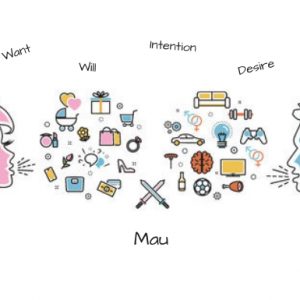Last updated on January 25, 2024
What is the equivalent of the second person pronoun you in Indonesian? It turns out that there are a lot of answers to this question. The choice of pronoun, especially the second person pronoun, has a lot to do with questions of sociolinguistics: dialects, politeness and culture.
Anda or Kamu
In formal Indonesian class, we were taught two ways to address a person you are talking to: Anda or kamu. Basically, Anda is the more polite and respectful word, used with elders or important people, and kamu is the less formal word used among friends. This is similar to the Spanish use of usted and tu, the French use of vous and tu, or the German pronouns Sie and du.
Elo, Lo, Elu
In the type of Indonesian spoken in Jakarta, there is another choice: elo (or lo or elu). Since this is a non-standard, regional way of speaking, it is considered very informal or slang. The words actually come from Hokkien Chinese, but were used in Betawi Malay before they became part of the way of speaking Indonesian in the Jakarta area (and in TV shows and movies made in Jakarta).
Engkau, Kau, Kalian
There are even more pronouns for “you”, like engkau, kau and kalian, but what we didn’t learn in class is that in many cases Indonesians don’t use pronouns to refer to the person they are talking to. They might use a title, the person’s name or nothing at all.
Bapak and/or Ibu
The most common titles used to replace a pronoun are bapak and ibu which literally mean ‘father’ and ‘mother’. This is considered a polite way of referring to the person you are talking to. Indonesians might also use the name of the person they are speaking to. For example, my name is Joey and I have received text messages like:
Senang sekali Pak Joey sudah di sini. (I am) very happy Mr Joey is already here.
or
Apakah Pak Joey mau datang? Does Mr Joey want to come?
My first reaction is always that they must be talking about someone else with the same name, because this is not a normal way for English speakers to address each other. But for Indonesians, using someone’s name to address them is a respectful way to refer to the person that avoids the danger of choosing a pronoun that is either too polite (and distant) or too informal (and disrespectful).
No Pronoun
Finally, another choice is just not to use any word to refer to the person you are speaking to. It can just be left blank. As long as the context is clear enough, your listener will know you are referring to them.
Mau ke mana? Where are (you) going?
Sudah selasai? Have (you) already finished?
Learning to speak a language is not just about memorizing the words and grammar rules. It also involves learning about the culture and the ways that people communicate with each other. Figuring out when and where to use each strategy for referring to someone you are speaking to is not something that is easily done by sitting in a classroom or reading a book. It requires time spent in the culture watching how people behave.
Further references on sociolinguistics:
Beginner:
TEDx talk by Robyn Giffen on language and social identity.
Intermediate:
YouTube video on sociolinguistics by Martin Hilpert.
Advanced:
Brown, R. and A. Gilman. 1960. The pronouns of power and solidarity. In T.A. Sebeok (ed.), Style in Langauge. MIT Press. pp 253-276.
Johannes Helmbrecht. 2013. Politeness Distinctions in Pronouns. In: Dryer, Matthew S. & Haspelmath, Martin (eds.) The World Atlas of Language Structures Online. Leipzig: Max Planck Institute for Evolutionary Anthropology.
About the author: As a linguist, Joseph Lovestrand is mostly interested in studying indigenous languages, and seeing what they have to tell us about how we communicate, think and live. His research began in Africa. He lived for a year in Chad, studying the Barayin language in order to help them establish their first ever literacy program. He also spent four years working in Cameroon where he managed projects supporting indigenous language communities and did field research on the Nyokon language. His most recent linguistic work has been in Indonesia, where he has consulted on a literacy program for the Kodi language in Sumba. Read more at: www.josephlovestrand.com

